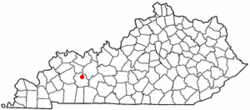Central City, Kentucky
| Central City | |
|---|---|
| City | |

St. Joseph's Catholic Church is at the corner of E. Broad St. and S. 3rd St.
|
|
| Motto: It's that friendly. | |
 Location of Central City within Kentucky. |
|
| Coordinates: 37°17′42″N 87°7′43″W / 37.29500°N 87.12861°WCoordinates: 37°17′42″N 87°7′43″W / 37.29500°N 87.12861°W | |
| Country | United States |
| State | Kentucky |
| County | Muhlenberg |
| Established | Morehead's Horse Mill, 1826 |
| Incorporated | Stroud City, 1873 |
| Incorporated | Central City, 1882 |
| Government | |
| • Type | Mayor-City Administrator- City Council |
| • Mayor | Barry Shaver |
| Area | |
| • Total | 5.2 sq mi (13.5 km2) |
| • Land | 5.2 sq mi (13.6 km2) |
| • Water | 0.0 sq mi (0.0 km2) |
| Elevation | 436 ft (133 m) |
| Population (2010) | |
| • Total | 5,978 |
| Time zone | CST (UTC-6) |
| • Summer (DST) | CDT (UTC-5) |
| ZIP Code | 42330 |
| Area code(s) | 270 & 364 |
| FIPS code | 21-13978 |
| GNIS feature ID | 0489282 |
| Website | http://www.centralcitykytourism.com/ |
Central City is a home rule-class city in Muhlenberg County, Kentucky, in the United States. The population was 5,978 at the 2010 census. It is also the largest city in the county and the principal community in the Central City Micropolitan Statistical Area, which includes all of Muhlenberg County.
The site of present-day Central City was originally known as Morehead's Horse Mill after local resident Charles S. Morehead's steam-powered gristmill. A larger community began to develop after the 1870 advent of the Elizabethtown and Paducah Railroad. A post office was constructed the next year in 1871 and called Owensboro Junction after the projected 1872 completion of the Owensboro and Russellville Railroad. By 1873, the settlement was large enough to be incorporated by the state legislature as Stroud City, after local landowner John Stroud.
The same year, however, the du Pont's Central Coal and Iron Company began operation in the area and became so vital to the local economy that the city was reïncorporated in 1882 as Central City. Recessions replaced the E&P and the O&R with a procession of different companies, including the Owensboro and Nashville Railway, but the two rights of way always remained in separate hands, keeping Central City an important regional hub for the Illinois Central and the L&N, with train yards, roundhouses, and even an elevated rail station. Coal was mined from nearby fields, prompting explosions such as one in 1912 that killed 5 workers.
...
Wikipedia
